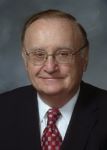Plenary Speakers
 Comprehensive Characterization of Protein Targets and Biopharmaceuticals Comprehensive Characterization of Protein Targets and Biopharmaceuticals
Prof. Barry L. Karger
Director, James L. Waters Chair in Analytical Chemistry
The Barnett Institute, 341 Mugar Northeastern University
Boston MA

Barry L. Karger is the James L. Waters Chair in Analytical Chemistry and the Director of the Barnett Institute of Chemical and Biological Analysis at Northeastern University, Boston. Dr. Karger received his B.S. in Chemistry from MIT in 1960 and his Ph.D. in Analytical Chemistry from Cornell University in 1963. In 1963, he joined Northeastern University, attaining Full Professorship in 1972. In 1973, he founded the Barnett Institute of Chemical and Biological Analysis. The Institute, a leading international bioanalytical research center, now has a major focus in proteomics and biopharmaceutical characterization. A new Center for Regulatory Analysis was recently established at the Barnett Institute.
For more information please click here
 Truly Hand-portable GC-MS - From Concept to Reality Truly Hand-portable GC-MS - From Concept to Reality
Professor Milton Lee
Professor at the Department of Chemistry and Biochemistry
Brigham Young University

Milton L. Lee received a B.A. Degree in Chemistry from the University of Utah in 1971 and a Ph.D. in Analytical Chemistry from Indiana University in 1975. Dr. Lee spent one year (1975-76) at the Massachusetts Institute of Technology as a Post-doctoral Research Associate before accepting a faculty position in the Department of Chemistry and Biochemistry at Brigham Young University, where he is the H. Tracy Hall Professor of Chemistry. Dr. Lee is currently the senior faculty member in chemistry at BYU. He teaches beginning chemistry to non-chemistry majors and graduate courses in his specialty.
For more information please click here
 Ionic Liquids in Separations and Mass Spectrometry Ionic Liquids in Separations and Mass Spectrometry
Professor Daniel W. Armstrong
Professor of Chemistry at the University of Texas at Arlington

Daniel W. Armstrong is the Robert A. Welch Professor of Chemistry at the University of Texas at Arlington. He received his B.S. (1972) from Washington and Lee University and his M.S. (1974) and Ph.D. degrees (1977) from Texas A&M University. He has nearly 500 publications including 22 book chapters, one book ("Use of Ordered Media in Chemical Separations") and twelve patents He has given over 450 invited seminars and colloquia worldwide. He is considered the "Father" of pseudophase (micelle and cyclodextrin-based) separations. He elucidated the first chiral recognition mechanism for cyclodextrins. He also first developed macrocyclic antibiotics as chiral selectors. He is one of the world's leading authorities on the theory, mechanism and use of enantioselective molecular interactions. Over 30 different LC and GC columns originally developed in his laboratories have been commercialized and/or copied worldwide. His work and columns were in part responsible for the chromatography and electrophoresis - lead revolution in chiral separations over the last two decades. This work provided the impetus for the FDA’s regulatory changes regarding chiral drug development in 1992. More recently, he has developed rapid, high efficiency, microfluidic methods for analyzing microorganisms and colloidal particles. He also developed the most comprehensive solvation and characterization models for room temperature ionic liquids (RTILs) and pioneered their use in analytical chemistry. According to the Scientific Citation Index, he is one of the most highly cited chemists in the world (see: www.isihighlycited.com).
For more information please click here |

